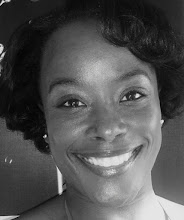I heard a guy say that on an episode of a popular TV show the other day. I'd first heard the term several months ago while on a course at work. A colleague made reference to a TV host - how well he carried out his job - then made the comment in a "but-don't-get-your-hopes-up" kind of way.
Since the first time I heard it, it has become like the recently-bought-car phenomenon. I figured, though, that perhaps it had been said pretty often within earshot before. Only difference was that I hadn't yet been clued in to what the phrase meant.
It makes me wonder how far "society" has come in trying to come up with "a way to say it"; "it" being as much an operative term as "a way". Given one of my roles as diversity lead in my branch, within an organization ranked as one of Canada's Top 100 Employers a few years now; an organization that is committed to non-discriminatory hiring practices, I have been involved in organizing diversity and inclusion meetings and event-planning more than the average bear.
In one of those meetings we were informed about a glossary of terms that had been made available for quick reference. This, in light of the fact that sometimes folks who want to engage in conversations about diverse groups, might feel awkward or unsure about using the "wrong" term. The term might be outdated or not generation-appropriate or some such thing.
I've heard someone say that when he was much younger, a homosexual male would have been referred to as a "queer" by someone outside of that community. At that time, it was deemed derogatory. Nowadays, however, he noted that younger "gay" men (a newer term itself) seem not to mind the term "queer"; as if their use of it is an effort to remove the sting that used to be felt by their predecessors.
I've also learned that the acronym is pretty long, as members of the - can I say it? - queer community seek to be included/recognized. For a few years now, LGBTQ has expanded into LGBTTIQQ2S, which stands for Lesbian, Gay, Bisexual, Transgender, Transsexual, Intersex, Queer, Questioning, 2 Spirited.
So, when I heard the phrase, "I play for the other team" the other day, it made me wonder about how, in one fell swoop, the term helped to shrink the long acronym, convey the same meaning and, for some, made the idea easier to convey (read: more "palatable" for the older heterosexual generation).
Question is, as is the case with all other diversity, inclusion, multiculturalism, integration and like matters that are encountered on a daily basis, how easy is it to keep up? Navigating your way through the PC maze sometimes proves a tad challenging. You might feel like you're constantly having to walk on egg shells. You might decide that you're not going to subscribe to the PC thing. The choice is yours. Still, ladies and gentlemen, such is the planet on which we now reside.
Regarding the moral debate concerning homosexuality, especially as a Christian writer? That's for another post. Suffice it to say, I go the route of being Christlike - loving people, and knowing that no one is beyond Christ's life-changing reach. And I say that from a heart filled with gratitude for that reach.
Above all else, love.
Claudia
www.cyopro.com
www.twitter.com/cyopro
Friday, 18 March 2011
"I play for the other team"
Subscribe to:
Post Comments (Atom)




No comments:
Post a Comment